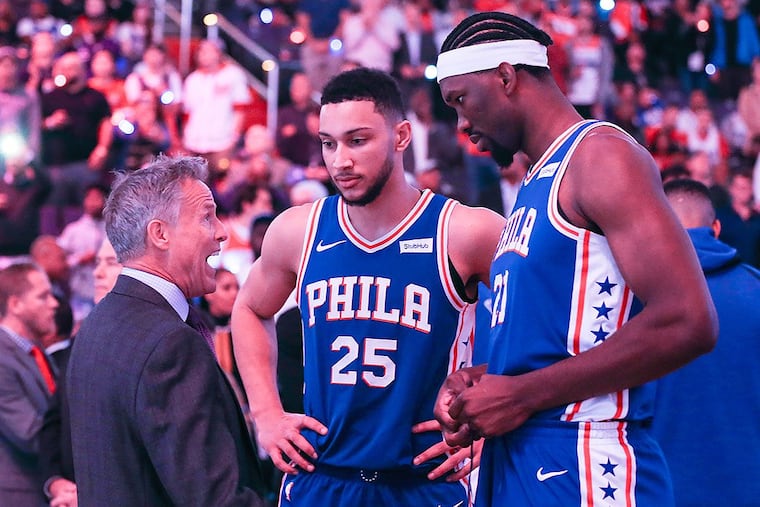Fire Brett Brown for his own good, and the 76ers’, too | Marcus Hayes
The coach deserves better. He always has deserved better. Firing Brett Brown would be freeing him for a better opportunity.

The marriage no longer works.
Brett Brown was the perfect match for The Process when it started. The relationship has soured. He lacks power. He lacks energy. He lacks, for the first time, answers.
Sabotaged by dilettante owners who have commingled with players and fostered a culture of insubordination, Brown cannot win with this collection of 76ers, built on the incomplete talents and habits of Ben Simmons and Joel Embiid. This collection of 76ers will not change in the near future. The expectations of this collection are, laughably, lofty. Unlike my friend and colleague Bob Ford, I believe something has to change.
Fire the coach.
Rather, free the coach.
Last season, Sixers managing partner Josh Harris suggested that Brown needed to win two playoff series to retain his job. He did not win twice, but he was not fired. This was disappointing. I’d hoped he’d be fired. It would’ve been less a termination than emancipation.
Six teams hired coaches after the 2018-19 season ended. Brown easily could have landed with one of them. Better yet, rather than rebuilding in Cleveland or Sacramento, Brown -- with three years and $15 million left on his contract -- could have spent a year watching his son, Sam, play his freshman season at Lower Merion High. Sam played great.
As might be expected of the most dysfunctional franchise in sports -- two imperfect general managers left in disgrace and were replaced with a third -- palace intrigue surrounded the decision to retain Brown after last season. Brown’s prickly relationship with free-agent guard Jimmy Butler made ownership’s decision an either/or prospect. Ultimately, the owners bet on Brett.
This would have been a better wager with a more sensibly constructed team. In his full year as GM, Elton Brand built a roster in his own, lumbering image, with no real bench and no proven three-point threat besides forward Tobias Harris, who entered the season a career 36.4% three-point shooter, which was just slightly better than average.
Yet even that shallow, “bully ball” (Brown’s term) assemblage might have achieved more if it had been healthier. Embiid missed 21 of 65 games. Josh Richardson missed 17. Simmons missed nine of the final 10. Al Horford played with a knee issue all season. Still, when coronavirus shut down the NBA, the Sixers, remarkably, had still won 39 games. Nevertheless, the coach broadly was considered a failure.
That’s because the Sixers had a 10-24 road record, worst among the 16 teams currently qualified for the playoffs and the only reason they were the No. 6 team in the Eastern Conference as opposed to being, say, No. 3. A quick glance at the numbers explains these results.
They rank No. 2 in defensive rating at home, but they’re No. 20 on the road. Brown, a defense disciple, swears that these defensive deficiencies precipitate their offensive shortcomings. They shoot 48.5% at home, fourth-best in the NBA, but just 44.7% on the road, 24th in the league.
Brown cannot divine, exactly, why. This is the most damning evidence: He cannot solve the puzzle this team presents.
Still, Brown deserves better. He always has. He won’t get it in Philadelphia.
Over the past seven seasons, Brown proved himself a gifted teacher. He turned Embiid, basketball ingenue, into the league’s most dominant two-way player. He turned Simmons, a college power forward, into an NBA point guard with the potential to be an elite defender. He turned Robert Covington, a G-League anomaly, into a legitimate NBA starter, and he made T.J. McConnell, undrafted and unathletic, a legitimate NBA backup.
Further, Brown proved himself a clever innovator. Two years ago, he incorporated Marco Belinelli and Ersan Ilyasova late in the season and won the franchise’s first playoff series in six years. Last year, he incorporated Tobias Harris, Boban Marjanovic, and Mike Scott at the trade deadline, and won another series, then took the eventual champion Raptors to a Game 7.
He accomplished all of this despite Embiid’s indifference to fitness and Simmons’ unwillingness to shoot. In 2018-19, he also endured Butler’s insubordination.
That insubordination perpetuated itself this season. Brown instructed Simmons to shoot three-pointers; in fact, he publicly stated a quota of at least one three-pointer per game on Dec. 7. Simmons, petulantly, took no legitimate threes after Brown’s proclamation. If the coach can’t get a star player to shoot the proper shot, either the coach or the player must go.
Brown routinely addresses Embiid’s poor conditioning. He expected Embiid to enter this season in peak fitness. It was, after all, Embiid’s sixth season overall, and his fourth as an actual participant, having missed his first two with injuries. When training camp began, Embiid’s fitness was, at best, mediocre. It somehow deteriorated as the season progressed.
If the coach can’t keep a star player in shape, either the coach or the player must go.
Simmons and Embiid aren’t going anywhere.
That leaves Brown as the one to leave.
The occurrence of the coronavirus pandemic has shut down the NBA’s 2019-20 season, almost assuredly for good. This abrupt ending provided a convenient door to accommodate an elegant exit for a patient, nurturing coach.
When the world finally resumes, there will be much change; much turmoil; much reorganization.
Nobody will pay much attention to a tidy little divorce.